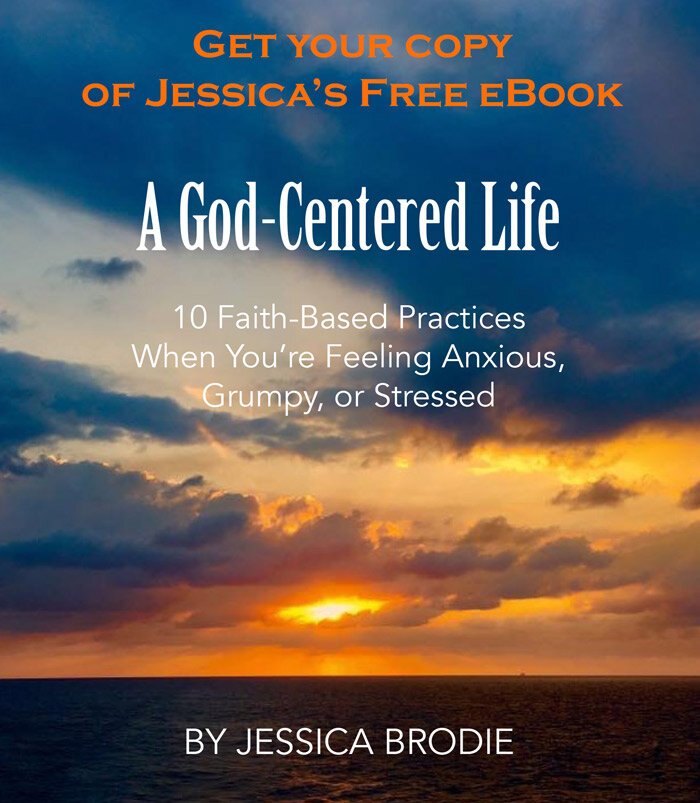When It Comes To The Hard Stuff
By Jessica Brodie
I still cringe when I hear it: “goody two shoes.” That was my nickname for a lot of my childhood. I was the kid who didn’t want to cuss, steal things, cheat on tests, all the stuff that would have earned me “cool” status in my neighborhood. I overthought everything, usually had my nose in a book, and took teasing and other jokes way too seriously.
It stung, but I couldn’t change who I was—until I realized I actually could. Then I went through a semi-rebellious stage, wore skirts too short and painted my lips too red and did what I could to seem edgy and interesting.
Only that backfired, and later I decided to just be me… a little weird, a little boring, a little wild, and always that person who’d far rather talk philosophy and the meaning of life at parties with perfect strangers than have “regular fun.”
Fitting in (or not) was a painful struggle for me for a lot of my life—until I realized I only ever wanted to fit in with Jesus. His club was the only one I truly sought. Admission got me snubbed sometimes from coworkers and others, but by then it was OK. There’s an odd sense of duty and honor, of righteous pride even, that swells inside your heart when you feel attacked or excluded for your faith. The Bible tells us we’re supposed to sacrifice for Christ, supposed to be unpopular and even persecuted for following the Way of Jesus.
But sometimes today it feels we’re repeatedly surprised at how hard it is to follow Christ. We think culture should naturally welcome the Christian, think the ways of the Lord should be the ways of the world. They’re not. As much as we’d love to bring about “thy Kingdom come on earth as it is in heaven,” earth isn’t heaven.
Indeed, that’s the easy stuff, really, the snubbing and the eye-rolls and the derisive, “Ohhh, she’s a Christian. That explains why she’s so nice.” Even if we don’t like being poked fun at, it’s all over Scripture—prophets jeered at, executed. Christian believers tortured, thrown in jail. Jesus’s own words from John 15:18-19 confirm it: “If the world hates you, keep in mind that it hated me first. If you belonged to the world, it would love you as its own. As it is, you do not belong to the world, but I have chosen you out of the world. That is why the world hates you” (NIV).
Want to be a Christian? Get ready for some hate.
But what if it’s not “the world” who’s “hating” you but your own Christian brothers and sisters? How do we reconcile that one with the words and ways of Christ?
I use the word hate here loosely. I don’t mean Christians actually hate each other. But we certainly can be guilty of “hating on” each other, harshly criticizing when one of our brothers or sister’s core theological beliefs differ from ours. We might throw labels at them meant to jab: we might call the conservative among us “close-minded,” “judgmental,” or “just like the Pharisees, too caught up in legalism.” We might call the progressive among us “too worldly” or accuse them of ignoring Scripture. But do we stop to think maybe God is the one who expressly convinced them of their perspective? Maybe this is God’s call on their lives, like Paul was called to the Gentiles? Maybe it serves God’s purpose that God’s children all interpret God’s great truth just a little differently? What if that’s their path, not ours, but there’s room for us all in God’s kingdom?
That’s the truly hard stuff—the stuff that draws censure, disparagement, or disapproval from our own brothers and sisters in the faith.
We don’t understand why someone might think or feel or behave a certain way, so we assume they’re wrong because it’s not how we think or feel or behave.
Recently, I was blessed to be part of a memorial service honoring more than 50 pastors and their spouses who had passed away over the past year. The preacher talked about the great sacrifices these people had made over the years, missing a child’s birthday party to be at a church member’s death bed, or consistently being late for dinner because someone in the flock needed something. So often, these men and women had to pick serving God over their own family—something we are explicitly called to do in the Bible—yet they were gossiped about and maligned, accused of being a bad parent or spouse or child.
This doesn’t even include what some of my brothers and sisters go through across the globe: arrested, tortured, imprisoned and killed for following Jesus and sharing the Gospel.
I wonder how I’d measure up if I were in their place. Would I crumble under questioning, say what authorities wanted me to say just to avoid the pain of death or abuse? I hope to God I would not.
Compared to what the first Christians experienced, the sacrifices we pay today are pale, but they are sacrifices nonetheless. They hurt, and they even hurt others. They require choices. Tough decisions.
But that is what we are called to do, whether we are pastors or however else we fulfill God’s call on our lives: Pay the price. Suffer in the name of Jesus. Heed God’s will and way no matter what.
If you are struggling with a choice today, remember: In the eyes of the world, there might be praise or scorn, accolades or stones. But the eyes of the world don’t matter.
It’s God’s eyes that matter. It’s pleasing God that matters.
Let the whispers and lies and cries of the world fade into the background. Instead, train your heart, mind and soul on God, and let God’s will guide you, now and always.


